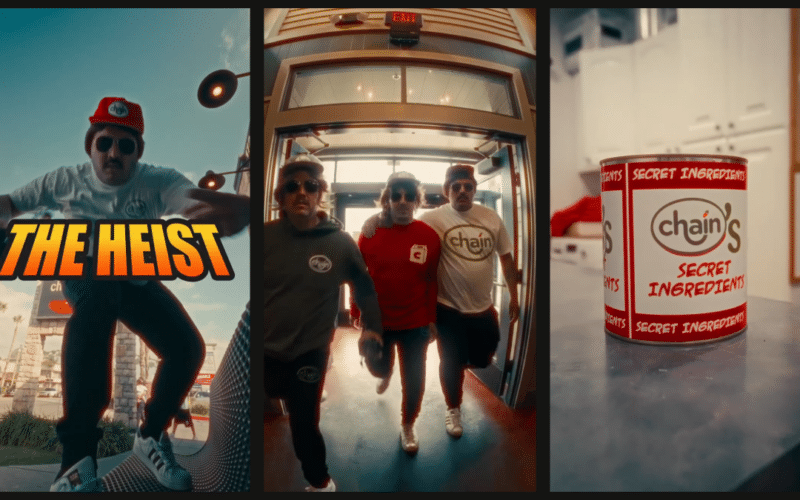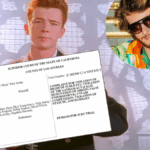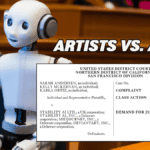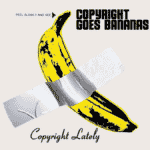The Beastie Boys filed a copyright infringement lawsuit against Chili’s over a ‘Sabotage’ parody, but is it a case of mistaken identity?
The Beastie Boys can’t stand it, but did Chili’s really plan it?
By now, you’ve probably heard about the copyright infringement and false endorsement lawsuit filed by legendary hip-hop group Beastie Boys against Chili’s Grill & Bar. The complaint (read here) accuses Chili’s operator Brinker International of using the band’s 1994 hit song “Sabotage” in an unauthorized social media video to promote the restaurant. But is Chili’s the real victim of sabotage here?
The plaintiffs’ complaint doesn’t include any screenshots or links to what they call the “Unauthorized Chili’s Video,” which features “three characters wearing obvious 70s-style wigs, fake mustaches, and sunglasses who were intended to evoke the three members of Beastie Boys,” performing scenes similar to those in the group’s own 70s-themed, Spike Jonze-directed video. Since the case was filed last week, hundreds of news outlets have dutifully parroted allegations that Chili’s was the perpetrator of this brazen IP theft, with nary a trace of the video at the heart of the dispute.
I get it; there are more important things for the media to investigate these days, so as someone whose stomach was once sabotaged by an Ultimate Smokehouse Combo, I was happy to take up the slack.
With a bit of effort, I tracked down the offending clip on the social media feeds for Chain, a Los Angeles concept restaurant founded by actor B.J. Novak and Michelin-starred chef Tim Hollingsworth. Chain is an upscale culinary homage to iconic chain restaurant offerings and has, at various times, featured limited edition versions of BJ’s Pizookie, Outback’s Bloomin’ Onion, and Taco Bell’s Crunchwrap Supreme. If you’re cool with paying $65 for elevated versions of food you can get at your local TGI Friday’s for $20, this place is for you.
In November 2022, Novak—who famously starred in an episode of The Office set at a Chili’s restaurant—approached Chili’s about a collaboration with Chain. This culminated in a limited pop-up menu featuring gourmet takes on Chili’s favorites. The Chain team teased the collab on social media:

Consistent with its kitschy and casual aesthetic, Chain’s social media posts often feature riffs on memes and other pop culture staples. Enter the “Sabotage” parody at the center of the Beastie Boys lawsuit. It’s actually a promotion for Chain, not Chili’s, although it does feature three of Chain’s chefs (including Hollingsworth) breaking into a Chili’s restaurant to steal ingredients for their menu.
Here’s the video, which now appears to have been removed from Chain’s social feeds after I grabbed it over the weekend (for the purposes of comment, criticism, news reporting and teaching, of course):
In commenting on Chain’s Instagram post, Chili’s remarked that their “video is so good we’re not even mad you stole from us.” The Beastie Boys aren’t as forgiving, and the group’s surviving members famously keep their music out of commercials. In 2014, the group won a $1.7 million copyright infringement verdict when Monster Beverage used several Beastie Boys songs in a promotional video. Earlier that year, they settled another lawsuit after GoldieBlox used the song “Girls” in a toy ad.

The Beastie Boys’ Complaint
The Beastie Boys’ complaint is fairly sparse on factual allegations. It asserts that Brinker, the operator of Chili’s, “produced, sponsored and encouraged the creation and posting on social media” of videos to promote Chili’s restaurants, one of which featured significant portions of the “Sabotage” sound recording and musical composition. As you can see from watching the clip above, the video was primarily designed to promote Chain, not Chili’s, yet the complaint doesn’t even reference Chain’s involvement. This makes me wonder whether the Beastie Boys even saw the video or Chain’s social posts before filing their lawsuit. I’m also assuming that representatives of the rap group didn’t exchange any pre-lawsuit correspondence with Brinker, which would have almost certainly avoided all the ill communication.
Even if the Beastie Boys had sued the right restaurant, this whole thing seems like much ado about very little. Sure, Chain’s video is an homage to the Beastie Boys’ “Sabotage,” but that video was itself an homage to 1970s crime dramas like S.W.A.T., Baretta, and Starsky and Hutch. And let’s not forget that the Beastie Boys made a career out of repurposing others’ music for their own sample-heavy songs, not all of which were legally cleared. (I’m old enough to remember when the Beastie Boys were more often defending copyright infringement lawsuits than filing them.)
Contrary to the suggestion in the plaintiffs’ complaint, it’s not unlawful to merely “evoke” scenes from “Sabotage”—that’s the essence of parody. It also seems unlikely that members of the public would be confused into believing that the group was promoting Chili’s restaurants, especially when the video itself wasn’t even promoting Chili’s restaurants.
The copyright claims based on the use of the “Sabotage” song—both the sound recording and the underlying musical composition—are stronger. Still, whichever restaurant ends up defending this action will likely assert that using 24 seconds of the song was a parody or otherwise fair use. Contrary to popular belief, advertisements can, in fact, qualify as fair use parodies, although it has become a more challenging argument following the Supreme Court’s recent decision in the Andy Warhol case. I should also note that Chain’s Twitter account (sorry; I can’t bring myself to call it X) has only 971 followers and the video at issue received only 46 likes, which suggests that not a lot of people saw it.
Should Chili’s Be Dismissed From the Case?
The extent of Chili’s legal responsibility is less clear. The restaurant presumably allowed Chain to film the video footage in one of its locations, but that doesn’t necessarily mean that Chili’s played any role in creating the video or syncing it with the “Sabotage” music. If not, the only real basis for keeping Brinker as a defendant would be the fact that Chili’s reposted Chain’s tweet teasing its Chili’s-themed menu—a tweet containing a link to the video:

But that’s a very thin reed. A mere link or direction back (like a retweet or repost) to the original source of a preexisting post doesn’t create a new copy and therefore shouldn’t give rise to an independent copyright infringement claim. Here, the storage and instructions back to the original tweet by Chain took place entirely on Twitter’s servers, within the platform’s ecosystem. That’s why Chain’s deletion of its original post also deleted the video in Chili’s repost. And unlike some of the photo embedding cases I’ve written about before, there’s no claim here that Chili’s violated the Beastie Boys’ display right under the Copyright Act, as the only potential “display” at issue was a screenshot from Chain’s video. Therefore, unless Chili’s was involved in creating or exploiting the video in some other manner, Brinker really doesn’t belong in the case.

What do you think? Is Chili’s on the hook, or should the Beastie Boys fight for the right to sue the correct party? Let me know in the comments below or @copyrightlately on social media.
View Fullscreen






3 comments
Not only is the naming of Brinker possibly a very serious mistake, but why are the Second and Third Claims against “Monster”? Looks like they used the Word document from the last lawsuit and forgot to change a few words. Sloppy.
There are two separate issues here, implied endorsement and repurposing of the video concept and copyright infringement of a sound recording and composition. Let’s break these down into their two components.
First, implied endorsement. Maybe. Obviously this is a parody of the “Sabotage” video in terms of some of the style elements. It is not an exact copy of the style and action of the original video, it is an obvious parody and an homage to the original Beastie Boys Video. At the end of the day, there could be an argument for fair use here based on parody. That said, is there a causal connection between the two videos? Definintely. Is Brinker/The Chain House leveraging the knowledge in the public/popularity of the Beastie Boys video and their brand in general to sell their products? Definintely. So based on this, theres a case here for the Beasties to push the point for compensation based on the similarities between the two videos? Maybe.
The bigger issue is the unauthorised usage of the sound recording and composition of “Sabotage.” This is complete copyright infringement. There is no fair usage when it comes to a sync license of either a sound recording or composition for commercial exploitation, period. And this usage is commercial exploitation. The Fair Use doctrine absolutely does not come into play here as this is a commercial exploitation of the exact sound recording and composition for the purposes of marketing a third party product. Brinker/The Chain House purposely used an original work without obtaining permission from the owners and did so without making a deal with the owners or providing compensation. That is textbook copyright infringement, and the parties will have to pay compensation.
As to the Beasties having used copyrighted material in their own works as the author of this article states, that’s a completely separate issue which has no bearing on Brinker’s/Chain’s unauthorised usage of the sound recording and composition of “Sabotage” in their commercial, a song which is devoid of samples. In any case, the Beastie Boys are not on trial here, and this point is not germane to this case.
And, the fact that Brinker’s legal department allowed their marketing department to sign off on this is frankly malpractice. Novak and Hollingsworth’s legal counsel also should have known better.
To execute on, produce and market this video, contracts were signed between the parties, there’s definitely an electronic paper trail that will show the working relationship, and the collaboration between Brinker and Chain to co-market and co-partner in this campaign, which implies Brinker and Chain’s joint responsibility.
So is this copyright infringement? Yes. Are Brinker and Chain jointly responsible? Yes. The Beastie’s have the two companies dead to rights in regards to copyright infringement, and Brinker is responsible to provide compensation for this unauthorized usage.
Personally, I’d have named both companies in the suit as well as any production company or creative agency involved in this marketing campaign, and perhaps there will be a separate suit against Chain and others, but that’s speculation. What is incontrovertible in this case is a blatant case of unauthorized usage of the sound recording and composition of “Sabotage” for commercial exploitation without negotiation or compensation with the rights holders, and all the parties involved in the development, distribution and exploitation of this campaign are liable for copyright infringement.
Also – to Evan Cohen’s comment – there’s no mention of Mother in this filing – perhaps it was updated…